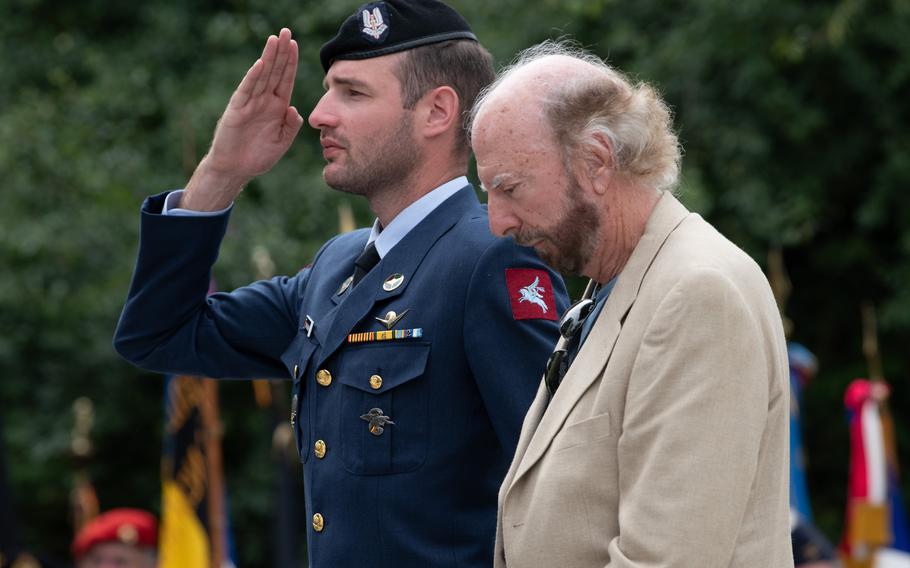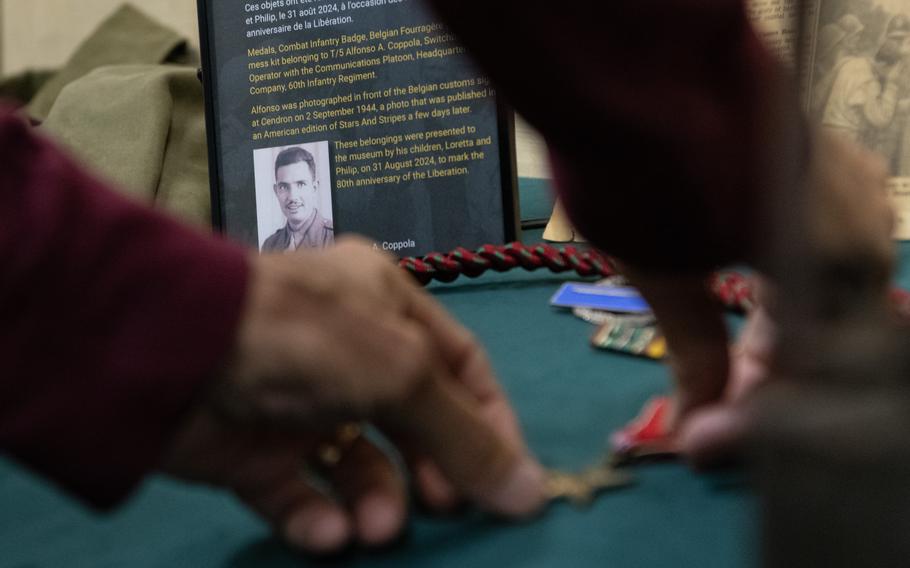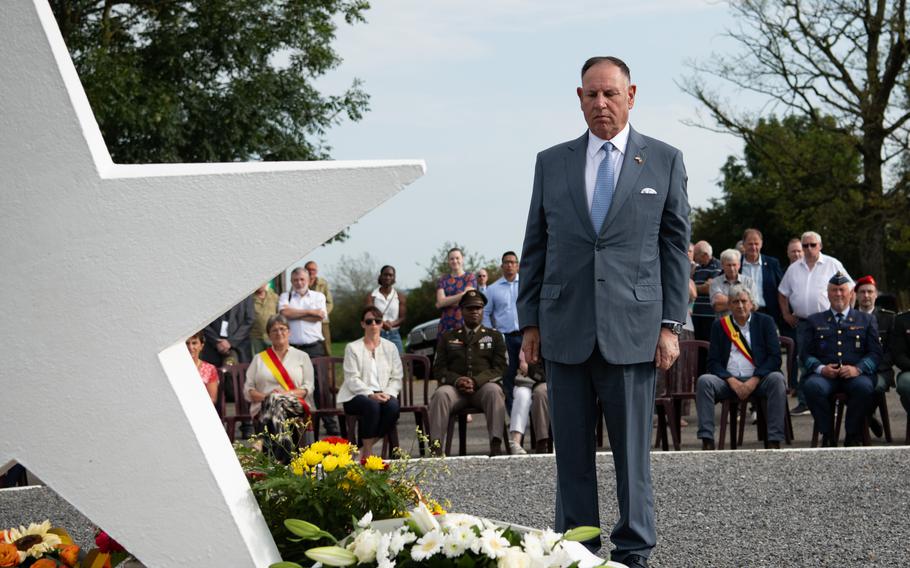.jpg/alternates/LANDSCAPE_910/030924BELGIUMphoto011.JPG)
Family members of U.S. soldiers who fought in Belgium attend a memorial in Cendron on Sept. 2, 2024, for the first American troops who entered Belgium to liberate it from Nazi occupation 80 years before. (Phillip Walter Wellman/Stars and Stripes)
CENDRON, Belgium — Technician fifth grade Alfonso Coppola was one of the first American troops to enter Belgium during World War II to free it from Nazi occupation.
On Monday, Philip and Loretta Coppola stood on the same road their father marched on, joining the commemoration of Belgium’s liberation exactly 80 years ago.
The siblings only recently learned about their father’s efforts in Belgium after doing their own research. Alfonso Coppola, like many soldiers who fought in Europe, didn’t like to talk about the war when he returned to the United States.
“I understand why,” Loretta Coppola said. “But we should know what they went through, it’s part of the world’s history.”
The Coppolas joined a gathering at the France-Belgium border that was smaller and more somber than the liberation celebration in nearby Mons a day before. But the message conveyed was similar: those enjoying freedom today have a duty to remember the efforts and sacrifices of the past.

Philip Coppola, right, and a Belgian soldier attend a memorial in Cendron, Belgium, on Sept. 2, 2024, for the first American troops who entered Belgium and liberated it from Nazi occupation 80 years ago. (Phillip Walter Wellman/Stars and Stripes)
Christel Delahaye, president of a local group called the Duty to Remember Association, runs a small war museum in the village of Monceau-Imbrechies.
She organized a separate ceremony Monday dedicated to the first 12 U.S. soldiers who died on Belgian soil during the liberation.
“Who would give their lives for people they don’t know, for the freedom of people they don’t know?” Delahaye said on the sidelines of the ceremony. “We want to show our gratitude to the American troops, we want to keep their memory alive.”
Delahaye’s father, Paul, opened the museum in the 1980s and launched the predecessor to the Duty to Remember Association, which has helped link the area to Americans related to troops who fought here.
The Coppolas donated some of their father’s memorabilia, including a Purple Heart and a Bronze Star, to the museum Saturday.
A photo they found in a 1944 copy of Stars and Stripes shows their father and his fellow soldiers in front of a Belgian customs sign at Cendron, footsteps away from where Philip and Loretta Coppola were Monday.
“He was right here. It’s overwhelming,” said Loretta Coppola, who was visiting Belgium for the first time.

Philip Coppola donates his father’s military medals to the 40-44 Lieutenant Cook museum in Monceau-Imbrechies, Belgium, Saturday, Sept. 31, 2024. A short bio and photograph of Coppola’s father, Alfonso Coppola, is included in the display. (Phillip Walter Wellman/Stars and Stripes)
The first U.S. troops entered Belgium at Cendron on Sept. 2, 1944. Within 10 days, American, British, Canadian and other Allied troops had liberated most of the country. But in December, Hitler launched his last major offensive on the Western Front, which came to be known as the Battle of the Bulge. About three months later, Allied troops had fully liberated the country.
James Jeffrey and his family also traveled to Belgium for this year’s liberation commemorations.
Jeffrey’s great uncle, 1st Lt. Robert Benninger, was a crew member of a B-17 bomber known as the Susan Ruth, which was shot down near Macquenoise, Belgium, in February 1944. Benninger survived the crash, but German soldiers later found him hiding with Belgians and killed him.
Jeffrey’s daughter, Grace Jeffrey, said she was impressed by the young reenactors she saw throughout the memorial weekend.
“These are people who have inherited the history, the understanding and the knowledge,” she said. “Similarly, it’s important for us to continue that story.”
Steven Snyder, whose father, Howard, piloted the Susan Ruth and survived the war, was also in Belgium with his family.
“World War II was 80 years ago. It’s fading in people’s memories, and we cannot let that happen,” said Snyder, who has visited the area several times.
Steven’s son, Clayton, named his 2-year-old son after his grandfather and plans to bring him to Belgium when he’s older to pass on the memories.
“We have a very specific family story tied to this event, and we want to make it mean something,” Clayton Snyder said. “It’s a responsibility but also an honor.”

U.S. Ambassador to Belgium Michael M. Adler on Sept. 2, 2024, lays a wreath at a memorial in Monceau-Imbrechies, Belgium, honoring the first 12 U.S. soldiers who were killed in Belgium in World War II. (Phillip Walter Wellman/Stars and Stripes)